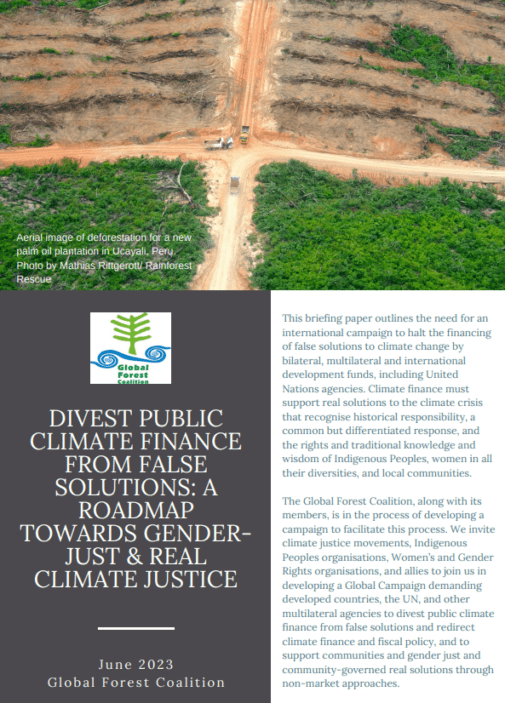NGOs Call on UN Climate Conference to Fix Flawed Carbon Accounting Rules: Don’t let our future go up in smoke!

A worldwide network of environmental groups take a stand against large-scale Forest Biomass burning to produce energy, a False Climate Solution.
Press Release, 21st October 2022 – Leading up to COP27, a network of more than 190 non-government organisations worldwide will take action today – the International Day of Action on Biomass – to highlight the impacts of large-scale biomass energy, a false solution to climate change that actually emits as much, if not more, CO2 as burning coal.
In November, governments will meet in Egypt where they will have the opportunity to fix the UNFCCC’s broken carbon accounting system. Currently, anyone looking to quantify emissions from energy production will not be able to find figures for burning biomass when they look at Energy Sector accounts, because, unlike fossil fuels, these very real, substantial emissions are not counted at the smokestack. Not surprisingly, this has led to the claim that burning bioenergy produces zero emissions, a dangerous fallacy that in turn has resulted in the development of policies that encourage biomass burning. The UN must also recognize that throwing wood into a coal-fired power station furnace along with the coal is not a credible form of emissions abatement – it extends the life of coal power and actually increases smokestack carbon emissions.
The proliferation of biomass energy around the world has come at a high social and environmental cost. To highlight this, a wave of online and offline actions and events, organised by the Biomass Working Group of the Environmental Paper Network (EPN), will travel around the world today – starting in Australia and moving to Asia, Africa and Europe, then on to the Americas. The Biomass Working Group has members in nearly 50 countries, who have all signed The Biomass Delusion, a position statement that articulates that burning forest biomass for energy is exacerbating the climate crisis.
Peg Putt (1), Coordinator of Policy and Campaigns for the Forests, Climate and Biomass Energy working group said: “Widespread concern about this fake “renewable” should be heeded by the UN climate conference, which can and should fix the root cause of the problem – the notoriously flawed accounting rules that enable a false impression of carbon neutrality to be perpetrated. On the basis of this false claim, many countries have promoted burning forests for energy at a time when we should be protecting them to keep carbon out of the atmosphere and biodiversity safe.
“Inflicting damage on natural forests, accelerating land grabbing and monoculture plantation expansion, exposing disadvantaged communities to pollution, all whilst accelerating climate change, are some of the impacts being highlighted in today’s wave of action on big biomass.”
Quote (2), Kazue Komatsubara, a researcher for Friends of the Earth Japan, said “Burning trees for electricity is neither sustainable nor carbon neutral but a new threat to climate and biodiversity. Japan’s reliance on imported wood pellets is responsible for the increasing destruction of forest ecosystems in the countries where the pellets are produced. Large-scale biomass power generation, including co-firing and the subsidies for it, must be stopped before it’s too late.”
Quote (3): Kwami Kpondzo, Friends of the Earth Togo, said: “Tree plantations for energy are already being established on a large scale throughout Africa, making it inevitable that large volumes of wood will eventually be exported to be burned in the Global North to meet the rapidly growing demand for biomass. There is already evidence of this emerging trend in Ghana, where a Norwegian company (APSD) has acquired large areas of land to establish eucalyptus plantations on. The exploitation of land in the Global South by companies in the Global North to make a profit is a form of modern-day colonialism.”
Quote (4) Yuyun Indradi, TrendAsia, Indonesia said, “In Indonesia, we have already experienced massive deforestation as a result of logging and the establishment of large-scale monoculture plantations by the pulp & paper and palm oil Industry, causing the Guinness Book of World Records to recognise us as the country with the fastest rate of forest destruction on the planet. Plans to develop more plantations to supply the biomass industry will only create a new threat to our remaining tropical rainforest and its biodiversity. We agree that coal-fired power plants must be immediately retired, but burning forests for energy is not the alternative. This only worsens the climate crisis and has to stop.”
Quote (5) Fernanda Andrade, a resident directly impacted by a biomass power station, Portugal said, “With no information provided to residents in advance or an environmental impact study, construction began in 2018 on a biomass power plant in Gramenesa-Fundão, next to our homes that have been here for decades. It works uninterrupted night and day. In addition to the various types of pollution emitted from the plant, noise being the most problematic, they also chip wood on site, right next to our homes. The daily stress and pollution caused by all this ongoing torment is seriously degrading our health. Sleep deprivation, nervousness, heart and lung problems, depression, and even the abandonment of people’s homes have been a constant throughout these nearly five years of torture. This biomass power plant and its chipping facility, built a few metres from our homes, is our slow death sentence.”
Quote (6) Diego Oyarzo, Colectivo Viento Sur, Chile said “Here in Chile, pulp and paper mills are building over-sized, dedicated biomass boilers in order to take advantage of strong policy support and financial incentives for producing electricity from burning wood. Arauco’s Valdivia mill built in the early 2000s in southern Chile is a good example of this. These are essentially stand-alone biomass power stations that require more feedstock than the waste produced by the adjacent pulp mills, meaning that additional wood is brought into the mill and burned in order to sell electricity to the public grid. These developments are not only increasing pressure on our forests and incentivising the establishment of monoculture tree plantations, but they also harm communities and increase carbon emissions.”
Quote (7) Jana Ballenthien, forest campaigner at ROBIN WOOD, Germany said, “In Germany, wood from forests is already being burned directly in power plants. The German energy companies are not yet involved in the big import business and the conversion of coal-fired power plants, but they are on the verge of it. On the International Day of Action on Big Biomass, we are demanding that Robert Habeck, the German Federal Minister for Economic Affairs and Climate, takes a strong stand against the burning of our forests in the RED negotiations and that the German government sets nationally ambitious goals for a socially-just and climate-friendly energy and heat transition and against the burning of wood in power plants.”
Quote (8) Bhola Bhattarai, NAFAN, Nepal said “Many indigenous and local communities are dependent on forests in Nepal. Around 44% of our forests are community-managed forests. In this context, the Nepal government should stop providing licences for industrialised, large-scale production and use of forest biomass for energy. The Biomass Energy Strategy 2017 supports the expansion of industrial biomass production in Nepal. Most affected are the thousands of forest-dependent women, Dalits, and other marginalized communities who get fodder, firewood, grass, timber, and herbs from the forest. If forests are instead exploited by the biomass industry to produce pellets on an industrial scale, poor forest-dependent people will lose their livelihoods.”
Quote (9) Jenny Weber, Campaign Manager at the Bob Brown Foundation, Australia said “Australia’s Labor Government is currently considering excluding native forest biomass from eligibility under our Renewable Energy Act. Failing to remove it would be a climate and biodiversity crime in this age of breakdown. Burning of logged wood from native forests releases far more emissions than coal and the loss of native forests also means we are losing a critical solution to mitigate the impacts of climate breakdown. Australia’s native forests are one of the strongest tools in sequestering carbon and must be protected.”
For more information about the International Day of Action on Big Biomass:
Visit the official webpage: https://environmentalpaper.org/2022/07/idoa-22/
Follow us on Twitter: #BigBadBiomass
See our position statement on large-scale forest biomass: Biomass Delusion
Contact: Sophie Bastable, sophie@environmentalpaper.org +351 965 565 711 (UTC +1)
Contact Information for quotes above:
-
Peg Putt, peg.putt@gmail.com, +61 418 127 580 (UTC +11)
-
Kazue Komatsubara, komatsubara@foejapan.org, +813 6909 5983 (UTC +9)
-
Kwami Kpondzo, kwadodzi@gmail.com, +228 90 13 57 68 (UTC +0)
-
Yuyun Indradi, yuyun@trendasia.org, +62 21 3005 3500 (UTC +7)
-
Nuno Forner, nunoforner@gmail.com, +351 911 507 704 (UTC +1)
-
Jana Ballenthien, wald@robinwood.de, +49 (0)40 380 892 11 (UTC+2)
-
Diego Oyarzo, doyarzo@gmail.com, +56 987197862 (UTC-3)
-
Bhola Bhattarai, nafannepal8@gmail.com, +977 985 107 4770 (UTC +5.45)
-
Jenny Weber, jenny@bobbrown.org.au, +61 427 366 929 (UTC +11)
Contact: Sophie Bastable, sophie@environmentalpaper.org +351 965 565 711
—








